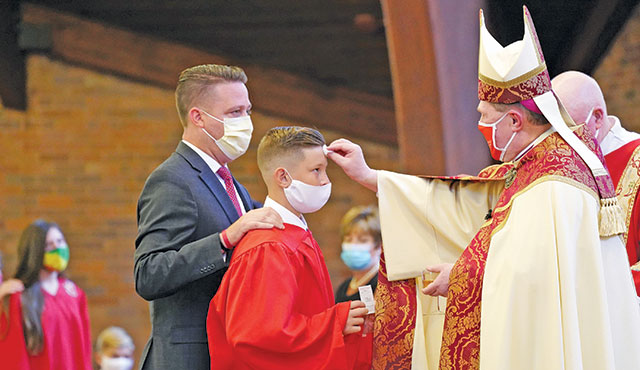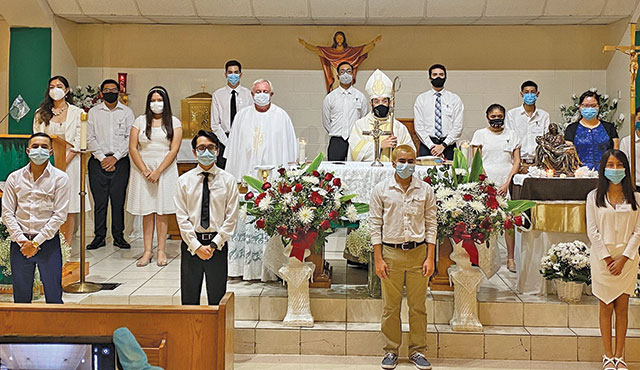How will confirmation season look this year? Now that parishes have experience celebrating during the pandemic, this year’s confirmations will be special in new ways while still adhering to key aspects.
Confirmation season is fast approaching and families may be wondering how it’s all going to work with the pandemic still making large gatherings a health threat.
But after a year of living with Covid-related restrictions, parishes have learned a lot about how to worship and celebrate special days while following safety precautions—and confirmations will take place just as they did last year, with a few updates so that more people can participate.
“Last year the Bishop delegated to pastors faculties to confirm teens through the end of the liturgical year, which was November 27,” explains Lesa Truxaw, director of the Office for Worship in the Diocese of Orange. Many parishes held confirmations outdoors in church parking lots with everyone standing six feet apart, all wearing masks. Families were disappointed not to have the Bishop present or to enjoy large celebrations, but the confirmations still featured memorable moments.
This year will be slightly different. “Pastors are once again delegated to confirm teens, but this year it will be from the second Sunday of Easter through July 30,” says Truxaw. “Parishes can request a Bishop to celebrate confirmation with them if Bishop’s schedule can accommodate.”
One thing is certain: There will be no confirmations via Zoom. “Sacramental celebrations have to be in person,” Truxaw emphasizes. “Reception of Holy Communion has to be in person. Celebrations accommodate for the pandemic by enforcing social distancing. And an option was given to us from Rome to anoint teens with a cotton ball or Q-tip should that be desired for safety reasons.”
Masks, however are not optional. “Masks are a given,” Truxaw says. “The Bishop’s mandate for mask wearing is for the common good, not just for the person wearing the mask.”
Each parish will celebrate differently. “Parishes are having to get creative and make decisions on how best to safely celebrate the Sacraments with their community,” says Armando Cervantes, director of Youth & Young Adults and Director de Ministerio Hispano. “Some parishes are having several Confirmation Masses in order to keep the number of people at a safe level. Other parishes are livestreaming the Mass so families can safely watch. Other parishes are choosing to have the Mass outdoors to be able to increase the number of people that can attend.”
Despite these variations, the confirmations will be as meaningful as ever. “The Mass will be special for kids and parents because they are receiving the Sacrament,” says Cervantes. “Covid does not negate the graces poured out from the Sacrament.”
And the restrictions have led to some positives. “Livestreaming celebrations could increase participation and that can be a benefit for some families,” says Truxaw. “Rather than look at it as a disappointment, I choose to look at it that we are blessed by the opportunity to gather and celebrate. Some parishes, due to the size of their physical churches, limit the number of people who can celebrate in a liturgy—even when we’re not in a pandemic. This year gives a lot more flexibility to Confirmations.”
All the key parts of Confirmation will take place, including the two years of preparation for teens, and the taking of a saint’s name. “Teens taking a saint’s name can still happen,” says Truxaw. “As part of their catechetical process they do research on a saint and can take that saint’s name. It’s one more person who we can look to for help, someone who has gone before us providing an example of how to live a holy life.” Teens age 19 and older are considered adults and are confirmed at Pentacost by the pastor.
“The liturgy itself has several points that touch people,” she goes on to say. “One is during the Confirmation prayer when the Bishop calls down
the gifts of the Holy Spirit. The most powerful moment is the actual anointing, with the sponsor standing beside or behind a young person, touching their shoulder.”
Truxaw says her hope is that it’s a prayerful experience for all involved. “I hope it is not just a perfunctory, but that people come with open hearts and open minds.”
Confirmation can resonate for participants long afterward. “The reality is not everyone has a ‘zap moment,’” says Truxaw, “so I don’t want to downplay the unfolding sacramental celebration that happens afterward, when a person notices a strength and ability to do certain things that wasn’t there before.”
How this happens is a mystery. “Noticing God’s action in your life is what we’re talking about,” she says. “Reflecting back on the celebration helps us recognize God’s action—which isn’t always a shout; it can be a whisper. My hope is that families will take the time to reflect with their teen what that means a month after. Let’s mark this celebration to help our teens and ourselves to reflect on God’s action in our lives.”


